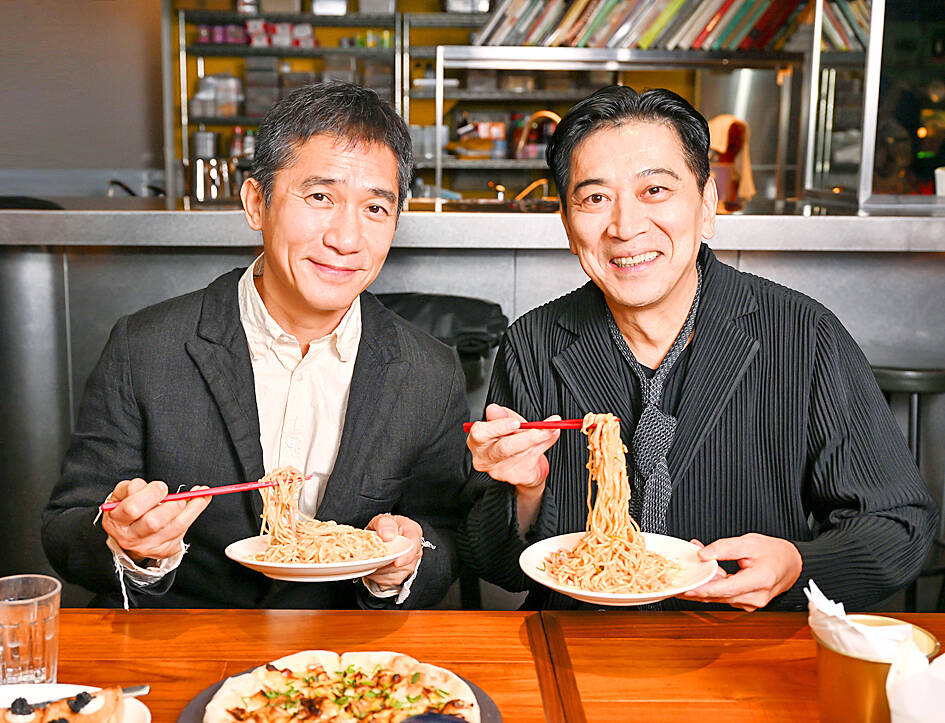Hong Kong actor Tony Leung Chiu-wai (梁朝偉) on Tuesday visited Taiwan for the first time in a decade to attend the premiere of the digitally restored version of A City of Sadness (悲情城市).
The appearance of Leung — who had not visited Taiwan since attending the Golden Horse Awards in 2013 — along with much of the film’s original cast and crew was not announced in advance.
In the 1989 film by director Hou Hsiao-hsien (侯孝賢), Leung plays Lin Wen-ching (林文清), a deaf-mute doctor and photographer whose family is caught up in the events surrounding the 228 Incident on Feb. 28, 1947.

Photo courtesy of Activator Co via CNA
In a brief speech on stage, Leung thanked Hou for the “encouragement and inspiration” he gave him as a young actor, and recalled their conversations during their frequent trips throughout Taiwan while filming the movie.
Cinematographer Chen Huai-en (陳懷恩) also shared an anecdote about Leung, saying that the last scene they shot for the film was one in which Leung’s character, confronted on a train and asked where he is from, responds: “I am Taiwanese.”
Immediately after filming the iconic scene, Leung “had to rush to the airport to catch his flight back to Hong Kong,” Chen said.
Despite the reunion-like atmosphere of the premiere, Hou was unable to attend, due to health issues stemming from a severe case of COVID-19 in September last year, the film’s cowriter Chu Tien-wen (朱天文) said.
Although the 75-year-old director can now go on daily walks and is slowly recovering his strength, his doctors recommended that he skip the event, Chu said.
She said that she hoped Taiwanese audiences would see the digitally restored version of the film in theaters 33 years after its original release, even if they have already seen it.
“Regardless of how long it’s been, time always adds another layer of meaning to things,” she said.
The 4K digitally restored version of A City of Sadness is to be shown in about 60 theaters across Taiwan from Friday next week.

A drunk woman was sexually assaulted inside a crowded concourse of Taipei Railway Station on Thursday last week before a foreign tourist notified police, leading to calls for better education on bystander intervention and review of security infrastructure. The man, surnamed Chiu (邱), was taken into custody on charges of sexual assault, taking advantage of the woman’s condition and public indecency. Police discovered that Chiu was a fugitive with prior convictions for vehicle theft. He has been taken into custody and is to complete his unserved six-month sentence, police said. On Thursday last week, Chiu was seen wearing a white

EVA Airways, one of the leading international carriers in Taiwan, yesterday said that it was investigating reports that a cabin crew manager had ignored the condition of a sick flight attendant, who died on Saturday. The airline made the statement in response to a post circulating on social media that said that the flight attendant on an outbound flight was feeling sick and notified the cabin crew manager. Although the flight attendant grew increasingly ill on the return flight, the manager did not contact Medlink — a system that connects the aircraft to doctors on the ground for treatment advice during medical

The Taoyuan Flight Attendants’ Union yesterday vowed to protest at the EVA Air Marathon on Sunday next week should EVA Airway Corp’s management continue to ignore the union’s petition to change rules on employees’ leave of absence system, after a flight attendant reportedly died after working on a long-haul flight while ill. The case has generated public discussion over whether taking personal or sick leave should affect a worker’s performance review. Several union members yesterday protested at the Legislative Yuan, holding white flowers and placards, while shouting: “Life is priceless; requesting leave is not a crime.” “The union is scheduled to meet with

‘UNITED FRONT’ RHETORIC: China’s TAO also plans to hold weekly, instead of biweekly, news conferences because it wants to control the cross-strait discourse, an expert said China’s plan to expand its single-entry visa-on-arrival service to Taiwanese would be of limited interest to Taiwanese and is a feeble attempt by Chinese administrators to demonstrate that they are doing something, the Mainland Affairs Council said yesterday. China’s Taiwan Affairs Office (TAO) spokesman Chen Binhua (陳斌華) said the program aims to facilitate travel to China for Taiwanese compatriots, regardless of whether they are arriving via direct flights or are entering mainland China through Hong Kong, Macau or other countries, and they would be able to apply for a single-entry visa-on-arrival at all eligible entry points in China. The policy aims